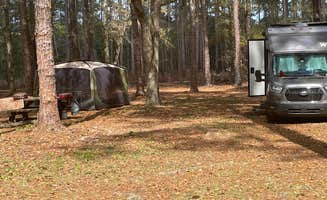Dispersed camping locations in the Apalachicola National Forest provide free camping near Tallahassee, Florida with minimal facilities. The forest encompasses over 632,000 acres of wilderness and maintains primitive camping areas situated on forest service roads that can become rutted during rainy seasons. Summer temperatures regularly exceed 90°F with high humidity, while winters remain mild with occasional frost.
What to do
Wildlife observation opportunities: Porter Lake Dispersed Camp offers excellent river access for fishing and water activities. According to a recent visitor, "The river is beautiful to boat or kayak and fish" making it ideal for those seeking aquatic recreation in a remote setting.
Seasonal hunting preparation: Buckhorn Hunt Camp serves as a base for hunters during designated seasons. Outside peak hunting periods, the area remains relatively uncrowded, with one camper noting it's "Not all that busy outside of hunting season" which creates a peaceful atmosphere for general campers seeking isolation.
Night sky viewing: The significant distance from urban centers (30+ miles to civilization) creates exceptional stargazing conditions. The remote setting provides natural darkness with minimal light pollution, as campers report "at night total quiet just the wildlife" at Porter Lake Dispersed Camp.
What campers like
Genuine isolation: The primitive camping areas provide true distance from urban environments. One visitor described Buckhorn Hunt Camp as having "Spots are reasonably private" while noting the accessibility: "Easy to find and roads in are OK."
Basic amenities: While facilities remain minimal, some dispersed areas offer more than others. Porter Lake includes vault toilets and a water spigot, though as one camper observed, "They say non potable but there are no signs" regarding water quality.
Short escapes: These sites function well for brief retreats from urban environments. A camper characterized Porter Lake as a "Nice spot for a quick getaway from city life" despite noting "lots of road noise from the nearby bridge."
What you should know
Road conditions vary: Forest service roads require careful navigation, particularly after rain. Access roads like F13 experience regular commercial traffic as "There are alot of logging trucks who use the road during the day."
Limited facilities: Amenities differ between sites. Twin Poles Hunt Camp has no toilet facilities, while Buckhorn previously had portable toilets that were vandalized according to a recent visitor who reported "Did have portable toilets but some drunk idiots smashed them."
Fire restrictions: Fire policies vary by location. Hunt camps typically prohibit open flames while Porter Lake permits campfires in established rings. Always check current fire restrictions before your trip as regulations change seasonally.
Site availability: No reservations are accepted at these primitive sites. During hunting season, expect increased competition for camping spots, particularly at designated hunt camps.
Tips for camping with families
Safety preparations: The remote location requires self-sufficiency. Cell service remains inconsistent throughout the forest, requiring offline maps and emergency plans.
Water needs: Bring sufficient drinking water for your entire stay. While Porter Lake has a water spigot, one camper warned about potability concerns: "There is a water spigot. They say non potable but there are no signs."
Noise considerations: Cliff Lake Hunt Camp and other primitive sites offer varying levels of seclusion, though road noise impacts some locations. For the quietest experience, mid-week camping avoids weekend traffic on forest roads.
Wildlife awareness: Educate children about local wildlife including snakes, insects and larger mammals. Food storage in sealed containers prevents attracting animals to your campsite.
Tips from RVers
Access limitations: Many forest roads have low-hanging branches and rough sections that challenge larger vehicles. Smaller, more maneuverable RVs navigate these conditions more successfully.
Site selection: At Porter Lake, drive-in sites accommodate smaller recreational vehicles. One camper noted the campground "is at least 30 miles either way on F13 (dirt road to campgr) and other RTS to any type of civilization" which requires thorough trip planning.
Supply management: With significant distance from stores or services, RVers must arrive fully stocked with supplies. Plan for complete self-sufficiency during your stay at these no-hookup locations.


